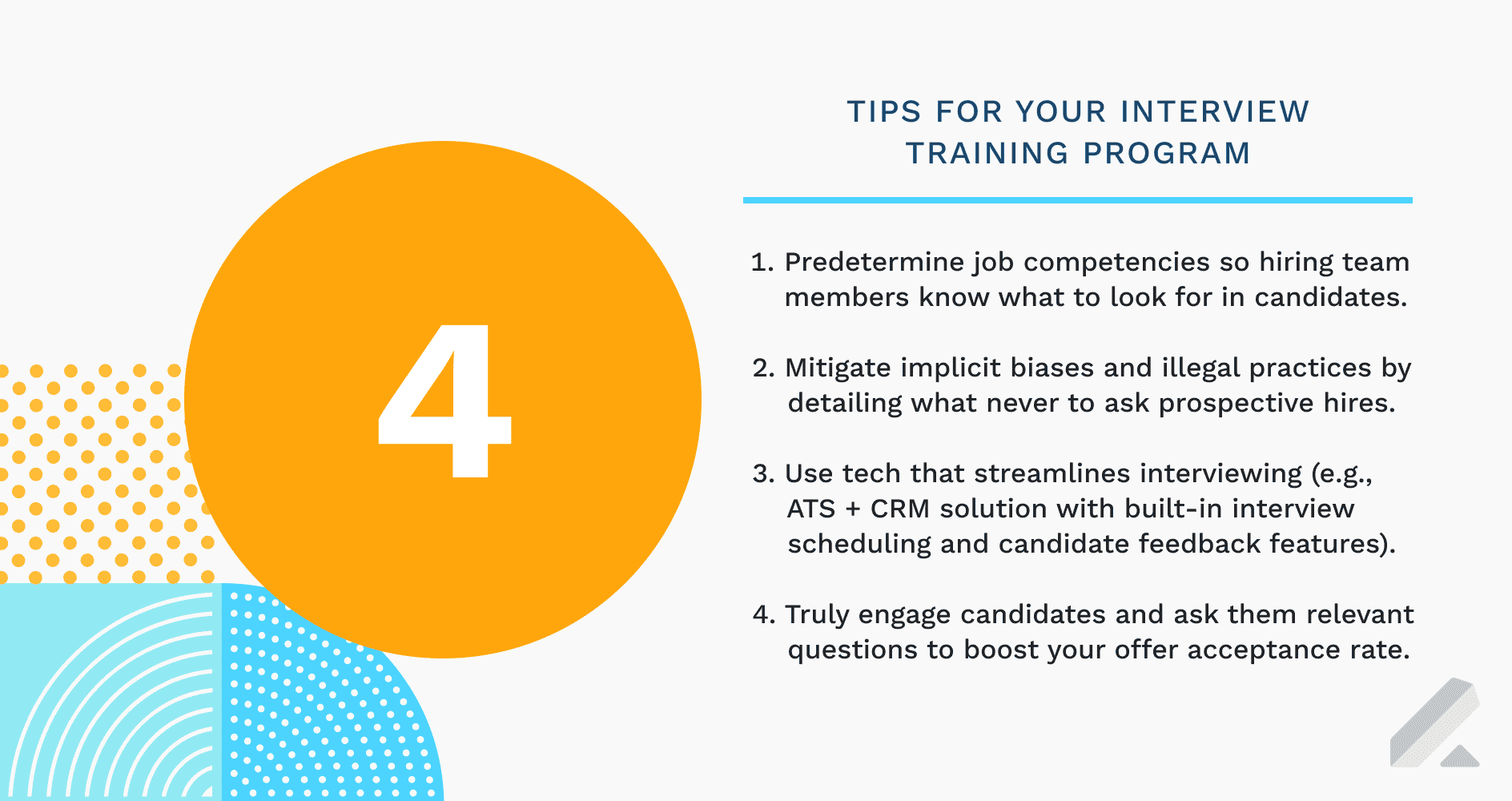There’s no better predictor of job success than a rock-solid interview. That makes the creation of an interview training program vital to your recruiting and hiring success.
Good interviewing is a critical to both sides of the hiring equation. It’s a main factor for most candidates when deciding whether or not to accept a job offer. Moreover, it’s how companies can better compete for scarce, high-quality talent on the market.
The fact nearly half of all hiring managers report never having been trained on how to conduct an interview tells us that something is broken.
As a talent acquisition leader, putting in the work to attract new employees in a candidate-driven market is tough. (Especially if you handle most of your org’s interview logistics.)
But with an amazing interviewer training program in place — one that gives your recruiters and other hiring stakeholders the interview skills they need to engage and convert candidates — you can lighten the load for yourself.
4 expert interview training program tips
Great interviews generate higher offer acceptance rates, level up the quality of your hiring decisions and candidate experience — all in a way that’s both successful and scalable.
And great interviews start with amazing training.
Here are four ways you and your human resources team can build a training program that relays the premier interviewing techniques to TA team members and hiring managers.
1) Predetermine job competencies.
Interviewers should never go into an interview without knowing what they’re looking for.
Armed with a vision for what success looks like in the role they’re trying to fill, interviewers can then turn their attention to evaluating their interviewees fairly and effectively. (That is, by removing unconscious bias from the interviewing process.)
But, without knowing the “ideal” candidate, interviewers risk making bad or biased decisions.
As a hiring leader, you can set your entire interview team up for success by providing hiring criteria tied directly to job-specific skills and competencies.
What’s more, you can help interviewers avoid decisions based on the personal, demographic, or lifestyle chatter that often comes up during ad-hoc (see: unstructured) interviews.
2) Mitigate implicit biases and illegal practices.
Even with the utmost preparation, interviews can still go off the rails when an interviewer inadvertently asks illegal questions, or makes inappropriate comments.
Assuming that the interviewers already know which interview questions are “right” and “wrong” is the first mistake many hiring leaders make when it comes to legal compliance.
To prevent discriminatory interview practices — whether intentional or not — TA leaders should educate their team about current hiring laws.
After carefully pre-selecting the job-specific criteria for each role, create an up-to-date list of questions and topics to avoid during interviews.
This should include anything related to a candidate’s age, race, ethnicity, ability, gender, sexual orientation, religion, relationship status, or personal finances.
For example, instead of asking about the candidate’s country of origin, cue interviewers to ask if the interviewee is eligible to work in the country where the job duties need to be performed.
With training on how to stick to only appropriate topics, interviewers can both feel confident about their interactions with candidates (and the experience they provide them).

3) Leverage the right tech.
Legal compliance is a must. But there’s more to amazing interviews than just following rules.
By employing tech to support the administrative parts of an interview, hiring leaders can empower interviewers to increase the quality and fairness of their interviews even further.
When interviewers get bogged down with back-and-forth scheduling and rescheduling, manually updating the hiring status of each candidate, and managing interviews across various time zones, they have less capacity to focus on more important things.
But when recruiting technology takes care of the tedious tasks, interviewers are freed up for more valuable work, like building rapport with candidates.
In addition to increasing candidate engagement, the right tech can also be leveraged to put together diverse interview panels, which boosts candidate satisfaction even more.
4) Focus on candidate engagement.
In a candidate-driven market like this one, hiring leaders should assume that job seekers are interviewing with multiple companies. When that’s the reality, the engagement a candidate gets from your team could be just the advantage you need.
A focus on continuous candidate engagement will give you:
- Faster turnaround on hiring decisions
- More high-quality talent in your pipeline
- A higher number of engaged candidates
- A larger pool of more diverse candidates
- More candidates that turn into customers
To level up your candidate engagement, train interviewers to treat your candidates like your customers by giving them the power to self-schedule their interviews. Also, give them plenty of quality feedback throughout the hiring process, even if they don’t get the job.
While candidates who don’t win the job may be disappointed, nothing is worse than waiting too long to find out. Not only does hanging in limbo directly affect the candidate experience, but it also damages the employer brand.
Aside from interview training, focus on the candidate relationship and experience
The concept of the candidate experience has changed. It’s time to focus on the candidate relationship. Yes, candidates want their job search to be positive and stress-free. But, in this competitive market, top candidates desire much more than just an interview.
In Goodtime’s in-depth candidate relationship-building eBook, you’ll learn:
- How authentic connections are more valuable than ever when building a candidate relationship
- Why transparency and open communication are now key hiring differentiators for employers
- Why DEI is candidates’ top priority, as they look for companies with workers from all backgrounds
Download Goodtime’s eBook today to enhance your candidate engagement, and be sure to check out our Structured Hiring 101 guide to improve your interview approach.



